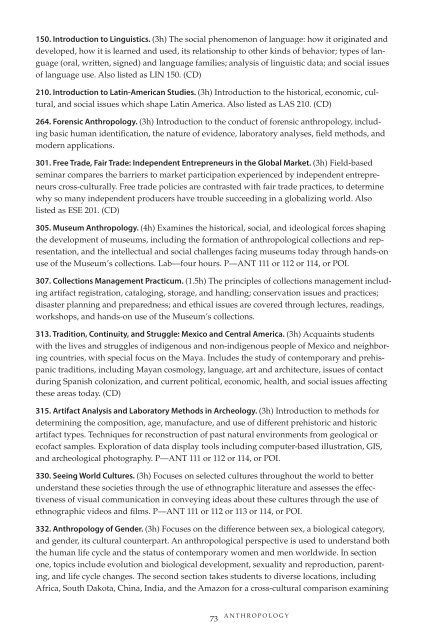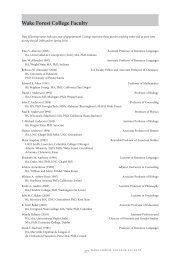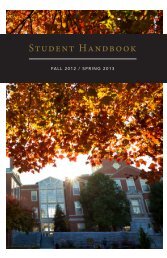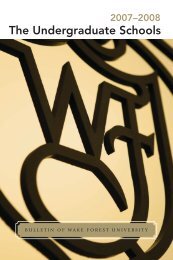theundergraduateschoo ls - Wake Forest University
theundergraduateschoo ls - Wake Forest University
theundergraduateschoo ls - Wake Forest University
You also want an ePaper? Increase the reach of your titles
YUMPU automatically turns print PDFs into web optimized ePapers that Google loves.
150. Introduction to Linguistics. (3h) The social phenomenon of language: how it originated and<br />
developed, how it is learned and used, its relationship to other kinds of behavior; types of language<br />
(oral, written, signed) and language families; analysis of linguistic data; and social issues<br />
of language use. A<strong>ls</strong>o listed as LIN 150. (CD)<br />
210. Introduction to Latin-American Studies. (3h) Introduction to the historical, economic, cultural,<br />
and social issues which shape Latin America. A<strong>ls</strong>o listed as LAS 210. (CD)<br />
264. Forensic Anthropology. (3h) Introduction to the conduct of forensic anthropology, including<br />
basic human identification, the nature of evidence, laboratory analyses, field methods, and<br />
modern applications.<br />
301. Free Trade, Fair Trade: Independent Entrepreneurs in the Global Market. (3h) Field-based<br />
seminar compares the barriers to market participation experienced by independent entrepreneurs<br />
cross-culturally. Free trade policies are contrasted with fair trade practices, to determine<br />
why so many independent producers have trouble succeeding in a globalizing world. A<strong>ls</strong>o<br />
listed as ESE 201. (CD)<br />
305. Museum Anthropology. (4h) Examines the historical, social, and ideological forces shaping<br />
the development of museums, including the formation of anthropological collections and representation,<br />
and the intellectual and social challenges facing museums today through hands-on<br />
use of the Museum’s collections. Lab—four hours. P—ANT 111 or 112 or 114, or POI.<br />
307. Collections Management Practicum. (1.5h) The principles of collections management including<br />
artifact registration, cataloging, storage, and handling; conservation issues and practices;<br />
disaster planning and preparedness; and ethical issues are covered through lectures, readings,<br />
workshops, and hands-on use of the Museum’s collections.<br />
313. Tradition, Continuity, and Struggle: Mexico and Central America. (3h) Acquaints students<br />
with the lives and struggles of indigenous and non-indigenous people of Mexico and neighboring<br />
countries, with special focus on the Maya. Includes the study of contemporary and prehispanic<br />
traditions, including Mayan cosmology, language, art and architecture, issues of contact<br />
during Spanish colonization, and current political, economic, health, and social issues affecting<br />
these areas today. (CD)<br />
315. Artifact Analysis and Laboratory Methods in Archeology. (3h) Introduction to methods for<br />
determining the composition, age, manufacture, and use of different prehistoric and historic<br />
artifact types. Techniques for reconstruction of past natural environments from geological or<br />
ecofact samples. Exploration of data display too<strong>ls</strong> including computer-based illustration, GIS,<br />
and archeological photography. P—ANT 111 or 112 or 114, or POI.<br />
330. Seeing World Cultures. (3h) Focuses on selected cultures throughout the world to better<br />
understand these societies through the use of ethnographic literature and assesses the effectiveness<br />
of visual communication in conveying ideas about these cultures through the use of<br />
ethnographic videos and films. P—ANT 111 or 112 or 113 or 114, or POI.<br />
332. Anthropology of Gender. (3h) Focuses on the difference between sex, a biological category,<br />
and gender, its cultural counterpart. An anthropological perspective is used to understand both<br />
the human life cycle and the status of contemporary women and men worldwide. In section<br />
one, topics include evolution and biological development, sexuality and reproduction, parenting,<br />
and life cycle changes. The second section takes students to diverse locations, including<br />
Africa, South Dakota, China, India, and the Amazon for a cross-cultural comparison examining<br />
A N T H R O P O L O G Y<br />
73






